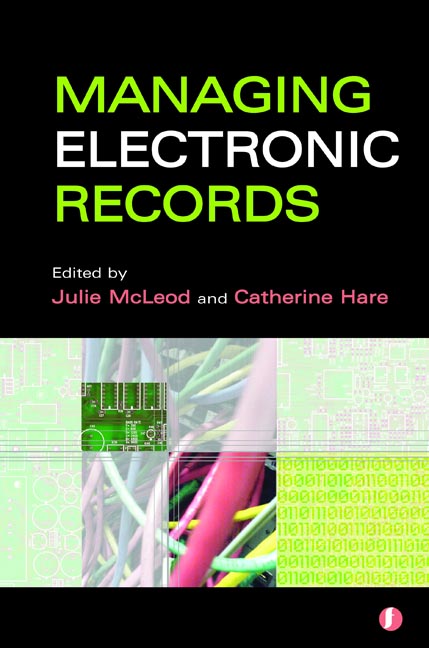Book contents
- Frontmatter
- Contents
- The editors and contributors
- Preface
- 1 The wild frontier ten years on
- 2 The use of standards and models
- 3 Metadata matters
- 4 Digital preservation – ‘the beautiful promise’
- 5 Research in electronic records management
- 6 Technologies for preservation
- 7 Legal issues
- 8 Ethics and electronic recordmaking
- 9 Competencies – the asset that counts most: on developing human talents as a prerequisite for successful EDRM changes
- 10 Records management: two case studies from the French private sector
- 11 Implementing a solution for electronic recordkeeping in the public sector
- 12 Playing the long game – creating and maintaining the links in the value chain
- Index
8 - Ethics and electronic recordmaking
Published online by Cambridge University Press: 08 June 2018
- Frontmatter
- Contents
- The editors and contributors
- Preface
- 1 The wild frontier ten years on
- 2 The use of standards and models
- 3 Metadata matters
- 4 Digital preservation – ‘the beautiful promise’
- 5 Research in electronic records management
- 6 Technologies for preservation
- 7 Legal issues
- 8 Ethics and electronic recordmaking
- 9 Competencies – the asset that counts most: on developing human talents as a prerequisite for successful EDRM changes
- 10 Records management: two case studies from the French private sector
- 11 Implementing a solution for electronic recordkeeping in the public sector
- 12 Playing the long game – creating and maintaining the links in the value chain
- Index
Summary
Introduction: of terms, concepts and plots
When we use (or address) concepts connected to the words ‘record’ and ‘archive’ we are, whether we realize it or not, standing above a semantic abyss. Space constraints, and concern for the reader's tolerance, do not allow me to explore this abyss. Suffice it to make a few preliminary observations, as a first movement, on my use of key words. First, my conceptualizations of ‘record’ and ‘archive’ are most heavily influenced by the interrogations and uses of the words by Jacques Derrida and Michel Foucault (see, in particular, Foucault, 1992; and Derrida, 1996). So that, for instance, I would happily regard as ‘archive’ the shared narratives of a collectivity. Second, by ‘recordmaking’ I understand that huge and messy realm in which what are conventionally called records creators, records managers, archivists, users and so on, negotiate, contest and narrate the meanings and significances of what are called ‘records’ (see Duff and Harris, 2002, for an extended making of the argument). In this understanding, records are always in the process of being made, they open into (and out of) the future.2 And by ‘politics’ I understand an equally huge and messy realm, reaching across orders of the individual and the collective, the personal and the public, in which the dynamics of power and authority engage with issues of principle. In this understanding, the ‘political’, arguably, coincides with the ‘ethical’. In this chapter, for the most part, I have focused my enquiry in terms of narrower categories – on ‘records’, particularly ‘archival records’, more particularly ‘electronic archival records’; and on the dynamics of power and authority in the public domain, particularly as exercised by structures of the state and of government. The patterns that emerge, I would argue (though space constraints do not allow it), are to be found as well in societal sectors we call ‘civil’ or ‘private’. Clearly, each of these categories also demands semantic sub-enquiry, but to go there would be to risk losing the plot before it's begun (see Harris, 2000, for further exploration of the semantic nuances archived in these words).
- Type
- Chapter
- Information
- Managing Electronic Records , pp. 115 - 128Publisher: FacetPrint publication year: 2005
- 1
- Cited by



